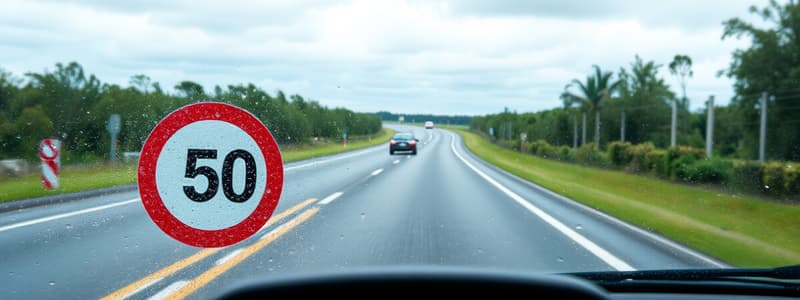Podcast
Questions and Answers
What happens to the force of impact when you double your speed?
What happens to the force of impact when you double your speed?
increase four times
What happens to the force of impact when you triple your speed?
What happens to the force of impact when you triple your speed?
increase nine times
Unless otherwise posted, what is the speed limit for cars in a residential area?
Unless otherwise posted, what is the speed limit for cars in a residential area?
30 mph
What is the maximum speed limit on an interstate highway?
What is the maximum speed limit on an interstate highway?
Can you be issued a ticket for driving too slowly?
Can you be issued a ticket for driving too slowly?
What are the steps for making a smooth stop?
What are the steps for making a smooth stop?
What is the arm signal for a left turn?
What is the arm signal for a left turn?
What is the arm signal for a right turn?
What is the arm signal for a right turn?
What is the arm signal for slow or stop?
What is the arm signal for slow or stop?
How long (distance) should you signal before making a left or right turn?
How long (distance) should you signal before making a left or right turn?
When can you use a three-point turn?
When can you use a three-point turn?
Where should you never make a three-point turn?
Where should you never make a three-point turn?
What is an open intersection?
What is an open intersection?
When must you yield right-of-way at an open intersection?
When must you yield right-of-way at an open intersection?
When may you drive in the left lane of a road with two lanes?
When may you drive in the left lane of a road with two lanes?
When may you drive in the left lane of a road with four lanes?
When may you drive in the left lane of a road with four lanes?
What does it mean if you see red reflectors on lane lines facing you?
What does it mean if you see red reflectors on lane lines facing you?
What should you do upon seeing red reflectors facing you?
What should you do upon seeing red reflectors facing you?
What is the recommended safe following distance?
What is the recommended safe following distance?
When should you increase your following distance?
When should you increase your following distance?
What are blind spots?
What are blind spots?
Study Notes
Force of Impact
- Doubling speed increases force of impact by four times.
- Tripling speed increases force of impact by nine times.
Speed Limits
- Default speed limit in residential areas is 30 mph.
- Maximum speed limit on interstate highways is 70 mph.
Driving Regulations
- Drivers can receive tickets for driving too slowly.
- Proper signaling before turns is required; signal at least 100 feet ahead.
Turning Techniques
- Arm signal for a left turn is a straight arm.
- Arm signal for a right turn is an arm raised upward.
- Arm signal for slowing down or stopping is a hand pointing downward.
Three-Point Turns
- Use a three-point turn only if the road is too narrow for a U-turn.
- Avoid three-point turns on curves, hills, highways, or where prohibited by signs.
Open Intersections
- Open intersections lack traffic control signs or signals.
- Yield right-of-way when entering if another vehicle is already in the intersection or if entering from a secondary to primary road.
Lane Usage
- Drivers must primarily use the right lane on two-lane highways, except to overtake.
- On roads with four or more lanes, drivers should remain in the right lanes unless overtaking.
Traffic Indicators
- Red reflectors indicate wrong-way driving, signaling a potential head-on collision.
- Immediate action required: turn around or switch to the correct lane.
Following Distance
- Maintain a minimum following distance of four seconds under normal conditions.
- Increase following distance in adverse weather, low visibility, heavy loads, and when behind emergency vehicles or trucks.
Blind Spots
- Blind spots are areas next to the left and right rear corners of the vehicle not visible in mirrors or peripheral vision.
Studying That Suits You
Use AI to generate personalized quizzes and flashcards to suit your learning preferences.
Description
Test your knowledge on Chapter 5 of the FL Class E Drivers Handbook with these flashcards. This chapter covers important concepts related to speed, force of impact, and speed limits in residential areas. Prepare for your driving exam by understanding these critical topics.




